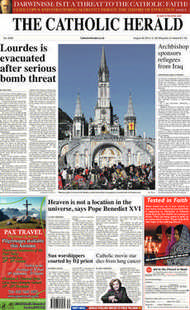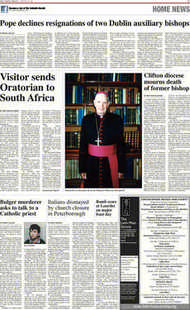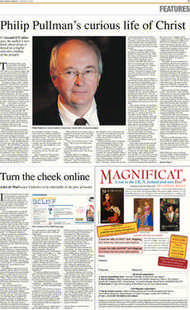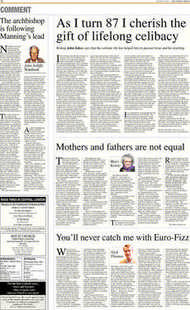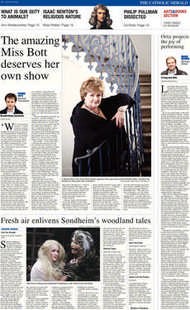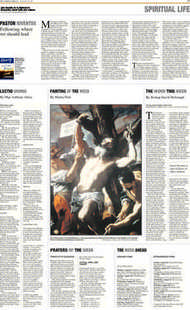Page 7, 20th August 2010
Page 7

Report an error
Noticed an error on this page?If you've noticed an error in this article please click here to report it.
Tags
Share
Related articles
Missing The Boat And So On. . .
Standing On The Frontier Of Religion And Science
Charterhouse Chronicle
Pope Benedict Xvi: The Master-teacher
Hit And Myth
‘Catholicism is a rational philosophy’
Why believe? It’s a question even the faithful often find hard to answer, and following the wave of antireligious books that topped the bestseller list in the first decade of this century, it is one Christians have had to answer with greater urgency.
Professor John Cottingham’s new book, Why Believe?, offers an outstanding answer and, although it is neither apologetics nor polemic, it does ask and answer the big questions that most of us struggle with.
In the book Cottingham explains why miracles are not impossible within the laws of the universe, why religious experiences, like the conversion of St Paul, are no less empirically true than the everyday workings of biology. He also delves into theodicy, explaining why God lets bad things happen, and eternal life, arguing that there is nothing irrational or unscientific about believing in a future existence after the body is consumed by worms. He also explains why atheists have not been able to successfully mimic Christian moral ideals, or create meaningful substitutes for religious rituals. The book is not lightweight, but then John Cottingham is Professor Emeritus of Philosophy at the University of Reading, Professorial Research Fellow at Heythrop College London, and an Honorary Fellow of St John’s College, Oxford, an expert on early modern philosophy (especially Descartes), moral philosophy, and the philosophy of religion.
This is his 10th book, among the previous being Descartes, The Rationalists, Philosophy and the Good Life and On the Meaning of Life. He has also produced many editions, translations and edited collections, and is editor of Ratio, the international journal of analytic philosophy.
“I really want to argue that religion offers a home,” he says, “a framework that makes sense of fundamental human aspirations which we all share, irrespective of our metaphysical views. It makes sense of our responses to beauty, truth and goodness. There’s a curious dissonance between these human responses and the official atheism, the official story that we are just an accidental by-product without purpose, and we have to make our own meaning on our own. Most people, when they are not subscribing to the official doctrine, naturally respond to the wonder and beauty of the world, recognise that there are things not of their making, eternal values.” Indeed. For it might be hard to believe this by reading a newspaper, but these are very good times for religion; it may be getting battered in the popular realm, but in the world of academia the future foundations of revival are being laid.
Most adults alive today have been raised in a society that is dominated by moral relativism and subjectivism, the most noticeable by-product being the disastrous postmodernism that flourished from the late 1970s and which is only now on the wane. But as Cottingham writes in the book: “It is very striking how the popularity of these subjectivist creeds has faded in recent times. Relativistic views of truth turned out to be selfdefeating. To everyone’s surprise, the growing consensus among philosophers is that some kind of objectivism of truth and of value is correct.” Cottingham has witnessed the rise and fall of such relativism. Raised in the post-war baby boom as a “fairly high church” Anglican in Betjeman country, he studied Latin and Greek from 14 and read Greats at Oxford during the late 1960s.
“I’m not sure it was a great period for philosophy,” he recalls. “It was a strange time: the height of the hippie movement, with sit-ins, a lot of drugtaking, experiments with free love. Looking back on it there was a lot of experimenting which really led nowhere. I’m struck by how my children’s generation have returned to older values.
“People have moved away from relativism and subjectivism. Most philosophers would now be objectivist about values. There really are values which don’t depend on what you or I happen to want. There are variations from culture to culture, but they are just variations on how far people have grasped the truth.
“There are certain core moral truths that are not relative and which all cultures respond to: the value of fidelity is universally acknowledged. It just happens in one culture you have to be faith
ful to three wives, but nonetheless the goodness of fidelity is universally recognised.” He is sceptical about the idea that human beings, cut from their wider connection with God, can synthetically create a value system that survives the test of time. “Meaning and value are something we respond to, not create,” he points out. So why has our society, and Europe in general lost its faith? He suggests that it’s not completely finished. “Religion hasn’t been buried as people said it would. I’m told the two fastest-growing A-level subjects are philosophy and religious studies.”
But there is certainly a huge difference between atheist western Europe and the rest of the world. In Why Believe? Cottingham makes more than one reference to William Wordsworth, and the “Wordsworthian interaction with nature”, and perhaps there is something missing here in Britain and other urbanised societies.
“We have created an environment that cuts us off from nature with modern urban living,” he says. “The opportunities for surrendering to something greater and finer, those are fewer than they used to be. This connects to Pascal’s theme that one learns to believe by going to church, by having these spiritual moments. Training oneself, as it were.” Some blame Pascal’s supposed cynicism – his wager that it’s best to live as if one believes, even if one has serious doubts – for quickening the collapse of religious belief in Europe. Cottingham smiles as he disagrees. “There are some problems, sure, but by underlying that there is something profound, that by opening yourself to an experience – maybe all church services aren’t good examples – at its best you do allow scope for something to grow.
“An example is parenthood. You can discuss the pros and cons theoretically but anyone who’s been a parent has opened themselves to the joys and vulnerability. They’ve learned the truth by doing it. This is exactly true of religion.
“It’s not a matter of theoretical debate. It’s a matter of the right kind of involvement leading to further response, which then opens you to evidence. Those who say we have to have scientific evidence for religion miss the point. It’s like staying outside a relationship and saying: ‘Give me the evidence that a relationship is fulfilling.’ ” Cottingham is one of the foremost experts on early modern philosophy and especially on Descartes. As a graduate he worked on the 17th-century French philosopher with Anthony Kenny, who he describes as one of the most distinguished philosophers of the late 20th century. “What interested me about Descartes was that it wasn’t narrowly linguistic philosophy,” he explains. “He was raising questions about the nature of mind, the relation between God and the physical world. He had a whole synoptic conception of reality and a philosophical system to go with it.
“A lot of people misunderstand him because of his seemingly egocentric starting point, cogito ergo sum, but he was a devout Catholic. Some of my recent work on Descartes is a de-secularisation project. The way Descartes and other early modern philosophers are taught now is often in a way that filters out reference to God.” For this he blames a secular culture that cannot understand the cultural tradition it came from was dominated by religion.
Ten years ago Cottingham converted to Catholicism, his American Congregationalistborn wife beating him to it by a year. “I’d been through various phases of near-atheism and agnosticism but gravitated back to the Anglican model. But I guess I felt the rationale had gone. When I was a small boy in the 1950s the map was coloured red. Queen and Empire and Church were part of a framework still in place. Now that’s no longer the case. But I’m certainly not polemical in my approach to denominations, I still think of myself as having Anglican roots, and I think most Catholics would think that fine. Of course history has not made it easy for us to bridge that divide.
“The universality of Catholicism also appeals to me. Whether one goes to Mass in Australia or Thailand or America it’s the same.” But perhaps more importantly Catholicism is the home of philosophy. “There is a wonderfully rich intellectual tradition – Augustine, Descartes, Pascal. One of the things I like about the Catholic tradition is the whole Natural Law perspective, that we can’t just take shortcuts. Instead, we have to look at the structure of the argument. Catholicism is a rational philosophy which is informed by faith.
“We need to use our Godgiven powers of reasoning to understand the moral and physical universe. We can’t just say: ‘Oh, its all in the Good Book.’ In philosophical argument we have to proceed on the basis of reason.
“I’m totally pro-science, but the language of science is precise and works on one level. The language of the humanities is polyvalent, it affects us on all sorts of layers. Religion works in that way, so the doctrine of substantiation, for example, has many layers of meaning.
“The faith is based on real experience, real human responses which are as much a part of reality as quantifiable and measurable properties that scientists study. It’s not as if any of it is irrational. All the parts of faith are compatible with the other aspects of truth. Pascal’s doctrine of ‘reasons of the heart’ doesn’t mean we’re abandoning rationality.” Why Believe? is published in paperback by Continuum, priced £10.99
blog comments powered by Disqus


